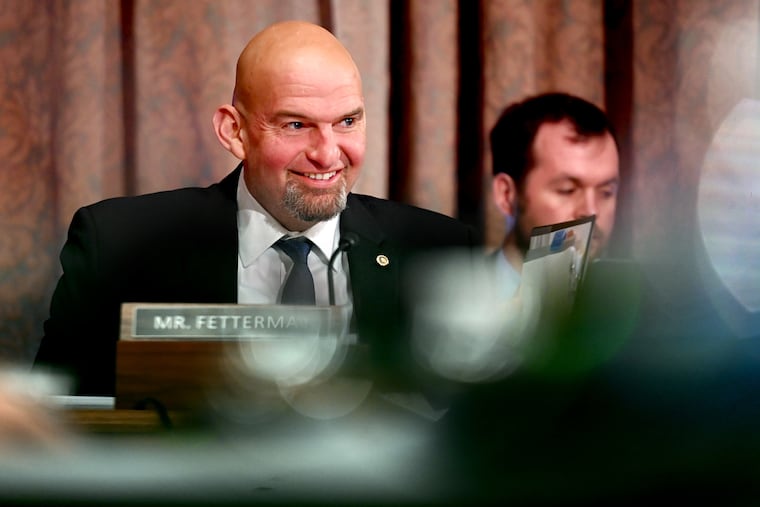What we learned from the Time cover story about Sen. John Fetterman’s depression
In a new interview with Time Magazine, Sen. John Fetterman opens up about his mental health and how he came out of the darkness of depression. Here are five takeaways.

In an interview with Time magazine, U.S. Sen. John Fetterman opened up about his mental health, how he came out of the darkness of depression, and his mental and physical recovery in the public eye.
The profile of the Pennsylvania Democrat was published Thursday and is being described as the senator’s “most extensive” series of interviews since receiving treatment for his stroke in May 2022.
It is also Time’s cover story, with the senator’s portrait featured on the Aug. 14 magazine cover.
Here are five takeaways from the piece:
Fetterman won the Democratic primary while having surgery.
Fetterman won his Democratic primary in a landslide May 17, 2022. But days earlier, his wife, Gisele, had noticed his face appearing to droop on one side. They were supposed to be heading to a campaign event. Instead, they drove to the hospital. He spent his day of victory under anesthesia, getting a pacemaker implanted in his heart. Before surgery, Fetterman said he recorded a video on his iPhone with a message for his three children in case he didn’t make it.
The Oz debate — months into stroke recovery — was his breaking point.
In an October 2022 debate between Fetterman and his Republican opponent, Mehmet Oz, Fetterman stumbled through answers. He stammered, failing to say what he meant, at one point struggling to say his own name. Fetterman said he thinks the debate will be remembered for decades. His own polling predicted a loss after it.
“I knew at that moment that I was going to be considered — consider myself — like, a national embarrassment,” Fetterman told Time. He described it as the catalyst for his depression.
Depression almost kept him from going to congressional orientation.
At the onset of his depression, Fetterman said, Gisele had to force him to go to the orientation for newly elected members of Congress the week after the election.
“Think of the insanity of that,” Fetterman says. “I work for two years. And at the end of that, after nearly dying, after the most infamous debate in American politics, I was going to not show up for orientation. That’s what depression does.”
According to Time, colleagues remember wondering why Fetterman barely spoke or made eye contact.
For months at home, Fetterman wouldn’t get out of bed. The January death by suicide of New York Times journalist Blake Hounshell — a fellow stroke survivor whom the senator had gotten to know — hit Fetterman hard.
An intervention pushed him into treatment.
Following a Feb. 8 retreat in D.C. for Senate Democrats, Fetterman thought he might be having another stroke. He was still in the early stages of navigating accommodations, such as using an iPad to help with auditory processing. At the event, he sat alone and didn’t talk to anybody. After, his staff took him to George Washington University Hospital, where he received fluids and tests.
Days later, Congress’ attending physician diagnosed him with depression and recommended inpatient treatment from Walter Reed’s inpatient neuropsychiatry program. Fetterman said it took an “intervention” from his staffers and family members for him to agree to go.
The doctor who oversaw Fetterman’s treatment described the senator as “passive, very flat, very unemotional, almost mute.” He said Fetterman’s depression exhibited as “a lack of responsiveness and flatness” and “a lack of spark or passion you would expect to see in humans.”
Fetterman’s doctors found that his hearing was severely diminished, which exacerbated his auditory issues. Today, he wears hearing aids. They also tweaked his heart medication dosage, which was too high after he lost a significant amount of weight.
The adjustments improved Fetterman’s health — including his sleep and emotiveness — within “a couple of weeks,” his doctor said. Six weeks later, he returned to the Capitol.
» READ MORE: What we learned about John Fetterman’s health, from his stroke last May to his recent hospital stay for depression
The stroke and depression made him a better senator.
Fetterman’s highly publicized experience represents a new era for candid discussions about mental health and efforts to remove stigma.
He says he’s become an evangelist for the treatment that “saved his life.” As noted by Time, mental-health conversations in politics were rare until recently. Sometimes, politicians talk about their issues — but in past tense.
But Fetterman’s experience has been met largely with support from the public as well as from colleagues of both parties.
“My message is, I don’t care if you’re a Trumper, MAGA, or hard leftist, or anyone in between. Depression comes across the spectrum, and get help with it,” Fetterman said. “It’s not a Democratic senator from Pennsylvania saying this. No. I’m just a husband and a father, somebody that was suffering from depression and got help.”
He added that his experience has made him stronger and that he hopes to be a voice for others in recovery.
“I thought I was really empathetic before, but after the stroke, and then after this — I think it made me a much better senator,” he said.